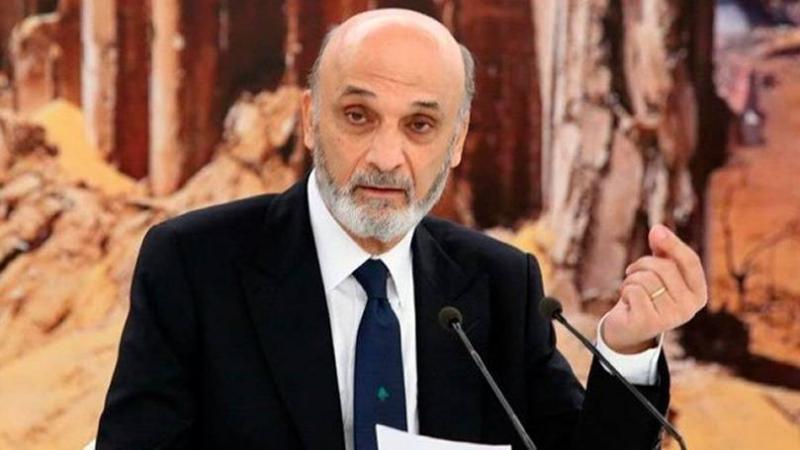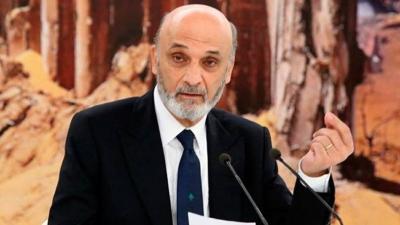The head of the Lebanese Forces party, Samir Geagea, commented on remarks made by Hezbollah Deputy Mohammed Raad, who stated that they are working to bring their preferred presidential candidate to power. Geagea said that this reflects their true position and should be taken seriously, dismissing previous statements. He praised Raad for telling the truth, asserting that they will continue to disrupt the presidential elections until they can install their chosen candidate in the presidency.
Regarding Hezbollah’s actual candidate, Geagea indicated that it seems to be Sleiman Frangieh at this point. In response to a question about the possibility of the Lebanese Forces backing Frangieh if it serves the public interest and avoids continued vacancy, Geagea, speaking to Al-Hurra, noted that while Frangieh is not the problem as an individual, the worst consequence for the country would be the return of a figure from the March 8 alliance or the resistance axis to the presidency. He affirmed that he would not support such an option as it is worse than the current vacuum, citing the negative experience with the presidency of Michel Aoun, and stating that if they gave their best under Aoun, they would offer even worse with others.
On the Lebanese Forces’ stance regarding the two-thirds quorum in the second session, Geagea considered it irrelevant, emphasizing that the quorum in the constitution is meant for the presence of MPs, not to be used for boycotting and disrupting sessions. He pointed out that even if they had a quorum of half plus one, the resistance axis would continue to disrupt as long as it is their intention, which they are capable of achieving with a few "sick" opposition members and others traveling. Thus, as long as there is an intention to disrupt, it is futile to discuss the quorum.
Geagea did not rule out the possibility of the Lebanese Forces disrupting a session to prepare themselves if they sensed something was being plotted behind the scenes, which is reasonable for one session, but they would not engage in halting the elections as is happening now with the resistance axis continuing its obstruction for more than two months. Responding to the question of whether the forces would disrupt the quorum if the opposing axis secured a half plus one majority for one of their own candidates, Geagea said they might disrupt one session to rectify the situation, but if Hezbollah and its allies gathered sixty-five votes that could not be breached, there would be no reason to continue the obstruction.
When asked whether they would accept the reality even if the candidate for the presidency was Sleiman Frangieh or Gebran Bassil, Geagea conceded that ultimately, yes, unless they chose to turn to another decision. He noted that after everything the country has gone through, to have a president from the March 8 camp would indicate a fundamental error in the entire system.
Regarding the possibility of a dialogue between the Lebanese Forces and the Free Patriotic Movement, Geagea stated that this could happen under one condition: the FPM must conduct a complete review of its strategic positioning and policies concerning the state, the arms outside the state, actual smuggling, and state management. He emphasized that the FPM bears significant responsibility for the current situation based on its support for Hezbollah and the Mar Mikhael Agreement. When asked about meeting Gebran Bassil, he replied that there is nothing personal against him if the FPM conducts the required review.
Geagea rejected the notion of some blaming Christian parties for the vacuum, stating that the Lebanese Forces, the Kataeb Party, the Liberals, and others had a candidate from the outset, whereas the FPM still has not clarified its candidate even today. He dismissed the generalizations that started with some he described as the chaotic elements of the revolution who raised the slogan "all means all," considering them marginal to the revolution. He stated that everyone knows who the actual revolution is, and he invited them to take action today as there are more issues calling for revolution than ever before.
In response to why the Lebanese Forces do not take the lead in street protests if they truly seek a revolution, he explained that they were proactive during the street protests, while recently they have organized legislative elections, interpreting this as their revolution. He expressed their attempt, along with opposition MPs, to instigate change, but lamented that some do not respond or wish to collaborate with anyone.
Geagea held the resistance axis responsible for obstructing the presidential election, as they are the ones who block the quorum after the first round. He noted that they disrupt the sessions because they remain divided on a presidential candidate. He observed that their policy since 2005 has focused on disruption to force people to accept "anything."
He criticized some reformists who place the Lebanese Forces among the ruling parties, describing their reasoning as juvenile. He mentioned that some reformists have become annoyed with the logic of some of their counterparts. He reiterated that people voted for them to change something, not just to deliver speeches in parliament. He acknowledged that some in their ranks are beginning to behave logically to achieve a result, while rejecting accusations directed at the Lebanese Forces regarding breaking apart the bloc of reformist MPs.
He criticized the reformists' rejection of adding names to the list of presidential candidates they established and questioned why, if they are thirteen MPs who created a list, it would not be permissible for fifty-four other opposition MPs to add three names to make six. He urged discussions among the total of sixty-seven MPs.
When asked about the possibility of another candidate aside from Michel Moawad, Geagea responded that if they bring a candidate with Moawad's qualifications who can secure additional votes, they are ready to support him. He noted that neither Moawad nor the Lebanese Forces are clinging to him; they are open to alternatives that meet those criteria.
He rejected discussions of a settlement that brings a president from the resistance camp and a prime minister from the opposition, calling it sheer political allocation, asserting instead that the approach is much simpler: they desire a president and a prime minister capable of leading a rescue operation for the country.
Regarding the chances of communicating with Hezbollah to reach solutions, he remarked that the party also needs to change its approaches, arguing that Hezbollah is today the main if not the sole reason for the country's destruction, having allied with failures and corrupt elements that have brought Lebanon to its current state. While they demand a president to lead a rescue process, he noted that Hezbollah seeks a president who protects the resistance, effectively guaranteeing their status quo. Therefore, he questioned what they could negotiate over.
On the possibility of the Lebanese Forces accepting Army Commander General Joseph Aoun as a presidential candidate, Geagea stated their preference for maintaining a normal political life and electing a president from the political sphere. Nevertheless, he indicated that if seventy or seventy-five MPs agree on the election of the army commander and it is evident through practice that he possesses the qualifications of a statesman, they would accept it as a way out of the current crisis. He remarked that there appears to be a significant veto against the army commander from Gebran Bassil, and likely also from Hezbollah, regardless of what they say.
He confirmed that no external forces have sway over the Lebanese Forces, citing their prior support for General Michel Aoun when the global consensus was against his election. In response to a question about the likelihood of a Christian-to-Christian dialogue under the patronage of Bakirki, Geagea expressed that some slogans are being raised out of context, as he does not see a threat to Christians that necessitates such dialogue. He added that reaching consensus on a president does not happen through dialogue but via side communications. He recounted that after more than one Christian-to-Christian dialogue, the largest two Christian parties endorsed General Aoun for the presidency, and the result has been devastation for the country and the Christians.




